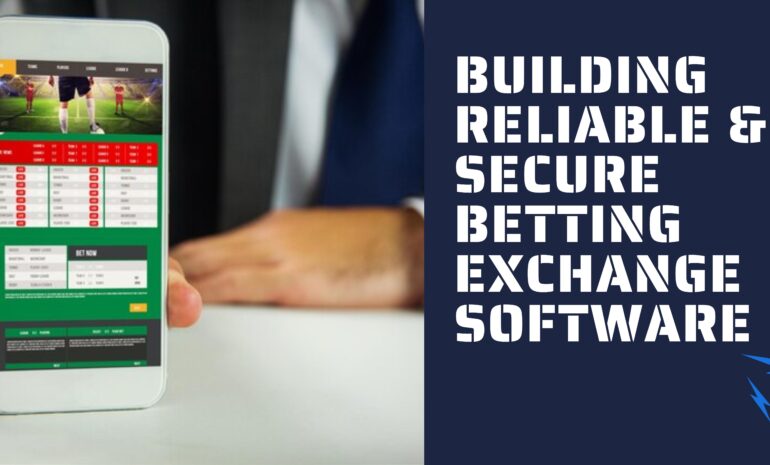Introduction
Definition of Betting Exchange Software
Betting exchange software is a platform that allows users to place bets against each other, rather than against a traditional bookmaker. It allows users to act as both bookmakers and bettors, setting their odds and taking bets from other users. The software facilitates the matching of bets, the calculation of odds, and the settlement of bets.
Benefits of Developing a Betting Exchange Software
Developing betting exchange software can provide many benefits. One of the main benefits is the ability to offer a wider range of markets and odds. Traditional bookmakers often have limited markets and odds, but with a betting exchange, users can set their odds and create their markets. This can attract a wider range of users and increase the overall liquidity of the exchange.
Another benefit of developing a betting exchange software is the ability to offer better odds to users. Because users are betting against each other, rather than against a bookmaker, the odds can be more favourable for the better.
A betting exchange software can also provide an opportunity for revenue generation by charging a commission on winning bets. This can provide a steady stream of revenue for the operator of the exchange.
In addition, the exchange software can be integrated with other features such as live streaming, live score updates, or even social features that allow users to connect, share tips, and engage in discussion.
Another important feature that should be considered while developing a betting exchange software is security. The platform must have robust security measures in place to protect user data and prevent fraud. This includes measures such as encryption, secure socket layer (SSL) certification, and two-factor authentication.
Another important feature that should be considered while developing a betting exchange software is security. The platform must have robust security measures in place to protect user data and prevent fraud. This includes measures such as encryption, secure socket layer (SSL) certification, and two-factor authentication.
The software should also be able to handle a high volume of traffic and transactions. This means that the platform should be built on a robust infrastructure that can handle a large number of users and bets at the same time.
Finally, the software should be able to provide real-time updates and accurate information. This includes features such as live odds updates, live score updates, and real-time settlement of bets. This can help to improve the overall user experience and increase user engagement.

Also, Read – What Kind of Features Should a rummy game app Include?
Top Features to Consider
A. User-Friendly Interface –
One of the top features to consider while developing betting exchange software is a user-friendly interface. A user-friendly interface can help to attract and retain users by providing an easy-to-navigate platform that is simple to use. This includes features such as clear and easy-to-read text, intuitive navigation, and easy-to-use betting options. This can help to improve the overall user experience and increase user engagement.
B. Variety of Betting Options –
Another important feature to consider is the variety of betting options. A betting exchange software should offer a wide range of markets and odds, allowing users to place bets on different sports and events. This can attract a wider range of users and increase the overall liquidity of the exchange. It should also have different types of bets and allow users to set their odds.
C. Live Streaming of Events –
Live streaming of events is another feature to consider. This allows users to watch live events as they happen, which can increase user engagement and improve the overall user experience. This feature can be integrated with the betting exchange software, allowing users to place bets on live events as they happen.
D. Real-Time Data Analysis –
Real-time data analysis is another important feature to consider. This feature allows users to analyze data in real time, such as odds, performance, and trends. This can help users to make more informed bets and improve their chances of winning.
E. Automated Risk Management –
Automated risk management is another feature to consider. This feature helps to mitigate risk by automatically monitoring and managing bets and user accounts. This can include features such as automatic stop-losses, which prevent users from losing more than a certain amount, and automatic fraud detection, which can prevent unauthorized access to user accounts.
F. Secure Payment Gateway –
A secure payment gateway is an essential feature to consider. This feature allows users to make secure and fast transactions, such as deposits and withdrawals. This feature should have robust security measures in place, such as encryption, SSL certification, and two-factor authentication, to protect user data and prevent fraud.

G. Comprehensive Reporting –
Comprehensive reporting is another feature to consider. This feature allows users to view detailed reports on their bets, performance, and account history. This can help users to track their progress and make more informed bets.
H. Responsive Customer Support –
Lastly, responsive customer support is an important feature to consider. This feature allows users to get help and assistance when they need it. This can include features such as live chat, email support, and a knowledge base. This can help to improve the overall user experience and increase user engagement.
Also, Read – How to start an online fantasy sports business in 2023?
Conclusion
In conclusion, these are some of the top features to consider while developing betting exchange software. A user-friendly interface, variety of betting options, live streaming of events, real-time data analysis, automated risk management, secure payment gateway, comprehensive reporting, and responsive customer support are all important features that can help to attract and retain users, improve the overall user experience, and increase user engagement.


